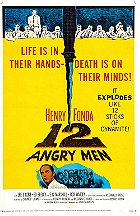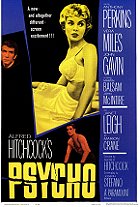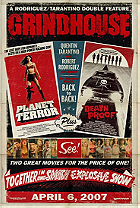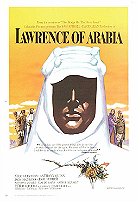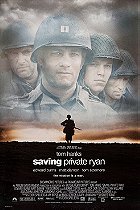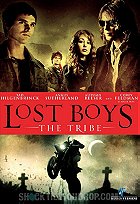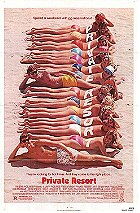How does one distinguish the difference between a masterpiece and just another ordinary comedy? For starters, an ordinary comedy is commonly clichéd beyond all comprehension - i.e. characters are standard, events are glaringly foreseeable and the structure is far too formulaic. In addition, an ordinary comedy usually features well-known actors who are so desperate for laughs that they overact (like Will Ferrell, Jim Carrey, and so on) rather than dispersing clever, witty, cerebral dialogue. In an ordinary comedy the laughs are also predominantly forgettable. And finally, an ordinary comedy is funny but nothing further. It doesn't break new boundaries...it's just another comedy that'll be long forgotten and relegated to the $5 bargain bin at your local shops. But when we're talking about Hollywood movie studios, the executives just want a quick buck to raise their annual profits. Ordinary comedies are easy to make, cheap, and quality is never the concern. Genuine masterpieces of the comedy genre are close to non-existent. Only John Cleese of the Monty Python fame could've been capable of developing the perfect comedy...and he succeeds!
A Fish Called Wanda ticks all the boxes to pull it out of the "ordinary comedy" territory. The film isn't clichéd at all; characters are extraordinarily well-written, the film isn't predictable, and the structure is original. The script is peppered with dynamite dialogue, in-jokes and memorable lines (that I continually quote almost daily) as it moves from one hilarious, creative scenario to the one succeeding it. It even breaks new boundaries with its prize-winning combination of laughs and creativity. It's purely one of the most entertaining films of all time! Best of all, despite countless viewing it always seems fresh and never fails to entertain me. And I’m not alone in my sentiments. The film pulled in $60 million in the USA, making it the highest grossing British picture in America at that time. All these ingredients ensure that A Fish Called Wanda is anything but ordinary.
On the surface, it probably seems difficult to imagine this film being even considered funny. After all, this is a flick concerning diamond robbers double and triple crossing each other, not to mention it's also somewhat mean-spirited at times and cruel to animals. But by golly the package works! The result will bring tears of laughter to your eyes and side-splitting pains to your stomach as you roll all over the floor laughing uncontrollably.
A Fish Called Wanda is reminiscent of the days of Fawlty Towers and Monty Python. This is Cleese in his element: finding himself in awkward situations and having to worm his way out of them. If you're a fan of Fawlty Towers (or is it Flowery Twats or Flay Otters or Watery Fowls?), like I am, you'll have a good grasp of the laugh-out-loud comedy I'm referring to. Considering John Cleese's mostly awful recent work, it's terrific to revisit those winners he scored back in his glory days. Seriously, not many comedies get nominated for Oscars! Let alone a comedy of British origins up for Oscar noms, ultimately walking away with one win. If you want the short version, here it is: if you haven't yet seen A Fish Called Wanda then you're missing out and should immediately visit your local shop to secure a copy.
A Fish Called Wanda is a simple tail...erm, tale about betrayal, love, lust, greed and seafood. Wanda (Curtis) and Otto (Kline) are a duo of American thieves who visit Britain to pull off a diamond heist. They team up with George (Georgeson) and the animal-loving Ken (Palin) to commit an armed robbery, walking away with a loot worth $20 million US. Trouble is...Wanda and Otto are lovers posing as brother and sister who plan to double-cross their collaborators, taking off with the loot themselves. But it also seems George and Ken are mistrusting of Wanda and Otto (despite George and Wanda commencing a relationship, which Wanda faked of course). George double-crosses Wanda and Otto by secretly moving the loot before Wanda and Otto have the opportunity to finalise their double-crossing of George! Anyway, George is dobbed into the police and is arrested. When Wanda and Otto realise they'll need to figure out the new location of the loot, a somewhat complex plan to find it becomes necessitous. This involves Wanda inveigling her way into the life of jaded Etonian Archie Leach (Cleese), George's barrister. However...what begins as a simple spot of using somebody to further her own means becomes more complicated as Wanda's attraction to this somewhat repressed and cute ("in a pompous sort of way") barrister grows. Oh, and then there's Ken's little project to dispose of the only witness to their diamond heist. Utter anarchic hilarity ensues.
The plotline is fun to be sure, but it's the characters that are at the heart of the film. The central appeal is the characters' faults and peculiarities - George is your typical evil mastermind, Wanda will sleep with anybody if the occasion calls for it, Ken prefers animals to humans, and Archie is a snobbish and repressed Englishman hen-pecked by wife (Aitken) and daughter (Cynthia Cleese, who's John's real-life daughter). Then there's Otto. He's...well...Otto. Kevin Kline plays the malicious and cruel but incompetent Otto with such wild abandon.
John Cleese is in his element as writer and an actor for the film. In addition to conceiving such rich characterisations and providing a tradition Cleese-esque performance, he also sprinkles the film with the kind of devilish humour he's revered for. His character of Archie Leach is a variation of Basil Fawlty from his popular TV series. He's a stiff-upper-lipped English barrister not above a little avarice and hanky panky. Cleese said he chose the name Archie Leach because it's Cary Grant's real name, and this was about as close as he'd ever get to being Cary Grant in a film. However, the film doesn't rely solely on John Cleese for the laughs as the rest of the actors are total knockouts.
Kevin Kline won an Oscar for his eccentric performance as Otto: an ex-CIA operative who reads the philosophies of Nietzche to make him look smart. But in reality he's so stupid! ("Don't call me stupid") He thinks Aristotle was Belgian, the central message of Buddhism is every man for himself, and that the London underground is a political movement. When Wanda calls him an ape, Otto replies with "Apes don't read philosophy". "Yes, they do, Otto," Wanda then replies. "They just don't understand it."
Otto's character is so well-written that there's always something new to pick up on. Kline never strikes an incorrect note, and definitely deserved the Oscar he received.
Playing Wanda, Jamie Lee Curtis is an absolute delight. She's as smart as she is sexy. From the deadly serious Halloween to a light-hearted comedy...Jamie Lee Curtis demonstrates her talents as a versatile performer. She even does a fine job of making Wanda curiously nefarious but intriguingly beguiling at the same time - when she's not snogging everyone that moves, that is.
Then there's Michael Palin (from the golden days of Monty Python) as the hapless K-K-K-K-Ken. He spends most of his time stuttering hopelessly (this is absolutely side-splitting at times) or tending to his animals. Kevin Kline is given a batch of hilarious lines in relation to Ken's stutter: "Are you thinking, Ken? Or are you in mid-stutter?", "...those phoney accents! Not you Ken, you've got a beautiful speaking voice...when it works" and so on. In Ken's assignment to kill a witness before George's trial commences, he instead accidentally targets the old woman's dogs in gruesome ways. This is all the more ironic because Ken is such an animal lover who wouldn't hurt a fly. Seeing him at each funeral for the dogs is just hilarious.
For Tom Georgeson's character, Cleese decided to do a clever name switch...calling the character George Thomason.
Despite its runaway success, A Fish Called Wanda wasn't all good news from the start. It was helmed by a director who hadn't worked for 25 years, it featured a male actor on the wrong side of 40, and it also featured a sexy female with a great body who refused to do any nudity. But those that gave the film a chance walked away raving. It established a template for the future of British comedy exports. Even Richard Curtis was taking notes at this time. The film walked away with a basket of awards. In order to reach such perfection, the script went through 13 drafts. Director Charlie Crichton and John Cleese got together three times a month for two-and-a-half years to give the script touch-ups.
When production finally started, they managed to wrap up filming in a mere four weeks. Crichton's economic direction meant not a day was wasted. This also gave the film its glorious fast pace. Before you realise it, the film is over and you're howling for more. Thankfully, though, none of the gags have dated and they seem fresh even after constant viewings. The snappy dialogue, the subtle images...even John Cleese's striptease are wonderful no matter how many times you watch the film. And finally, the film was given its definitive touch in post-production: the music. John Du Prez's music is catchy and atmospheric, and you'll be humming the theme for weeks.
Mixing Python-esque humour with a sweet touch of rom-com, A Fish Called Wanda is the greatest hour for any former Python. Originally known as the working title of A Wish Called Fonda, Cleese then reworked his original ideas and the result was this masterpiece of cinematic comedy. It even has a universal appeal, with characters being featured of different nationalities. This film is totally faultless. It's a solid movie that holds up surprisingly well after a number of decades. If the words uproarious, hilarious, or side-splitting mean anything to you, this is your film for sure! It improves with each new screening as a matter of fact.
This film doesn't rely on swearing for its laughs, nor does it rely on overacting either. It relies on its clever script and an impeccable bunch of actors instead. The same crew tried again about a decade later with Fierce Creature. A good attempt, but it wasn't the same. A Fish Called Wanda is one of a kind...and that kind is very, very funny and just plain FUN! Fans of John Cleese or Kevin Kline will not be disappointed. Come on, how can you resist the prospect of seeing Michael Palin running over Kevin Kline with a steamroller after Kline eats Palin's tropic fish?!
Highly recommended!
10/10
 Login
Login
 Home
Home 183 Lists
183 Lists 1670 Reviews
1670 Reviews Collections
Collections
 0 comments,
0 comments, 